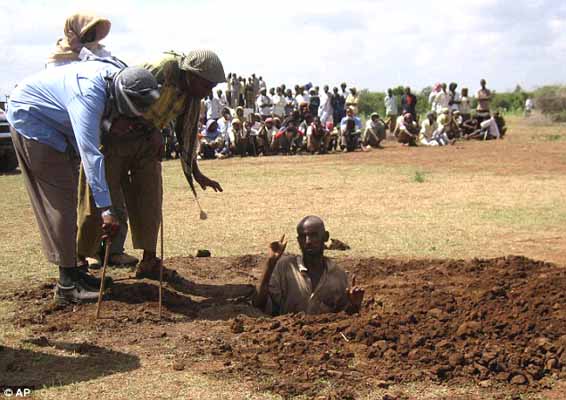
Minnesota Tries Expensive Social Programs to Cool Jihad Ardor among Somali Immigrants
10/06/2015
Every time the government takes another look at America-residing Muslims who decamp for jihad back in the homeland, the number gets higher, as shown in a recent House report. And some of the most stubbornly resistant to assimilation are the Somalis, many of whom reside in unlucky Minnesota.
To prevent young Somali immigrants from joining up for jihad, serious money is being invested by the government. In the Fox News interview below, Minneapolis-St. Paul reporter Tom Lyden remarked about local anti-radicalization programs for the Somalis: “We have about $2 1/2 million in the pipeline for Big Brothers, mentoring programs, jobs programs. The expression here is the best way to fight radicalism is to give a young man a job and have him build a life.”
That’s a lot of money to try to housebreak one of the world’s most backward, violent groups. What about American kids? Couldn’t the millions of dollars be more usefully spent on scholarships and such for them?
In 2011, I wrote a blog titled, Somali Immigrants in Minnesota: Import a Problem, Then Pay to Try to Fix It about a House hearing that included what a local police chief was doing to cope with the problems of crime and jihad. Here’s a bit about the dollar cost:
One interesting witness was the St. Paul Chief of Police, Thomas Smith. His testimony was enthusiastic about the wonders of police “outreach” to Somali youth. (Congressional Record pg. 304.) He made the St. Paul police sound more like social workers than crime-fighting cops. Smith described an array of fun athletic programs: “Our Police Athletic League has over 300 Somali American youth participants who compete in soccer, flag football, softball and volleyball games that are organized, coached and refereed by Saint Paul Police Officers.” Kumbaya is alive and well in Minnesota!Of course, top quality outreach like St. Paul’s does not come cheap. Chief Smith praised the success of AIMCOP (African Immigrant Muslim Community Outreach Program). AIMCOP is a two-year program funded by a Bureau of Justice Assistance grant at a cost of $670,679 to the taxpayers.
In 2006, the St. Paul Police received a grant for $250,000 from the Minnesota Public Safety Department for outreach to the Muslim/Somali community. The program focused on women’s issues and domestic violence, but apparently did not work well enough to prevent prostitution rings in three cities run by Somali gangs which forced girls under the age of 14 into the sex business.
So four years ago the local spending for trying to restrain Somali youth was a little under $921,000; now it is considerably higher with no assurance of success and more indication of failure. Worse, the Somalis keep coming at a rate of 800 per month, despite the group’s distinct inability to adjust as immigrants.
Interestingly, a documentary filmmaker interviewed Somalis on the streets of Minneapolis a few months ago and inquired whether they preferred Islamic sharia law to the American Constitution, and most thought head-choppy sharia was superior.
Below, Somalis prepare to stone a man to death for adultery in Somalia.

The Minnesota reporter sounds a lot more upbeat about assimilating Somalis than the facts warrant.
STEVE DOOCY: According to a shocking new report, 58 Americans have attempted to join ISIS in Syria since 2011. Fifty-eight! Of those, 15 are from the state of Minnesota, more than any other state. With more and more joining the jihad, what is being done to stop them from making it to the battlefield? Joining us right now a Minnesota reporter who’s been on this story for years, KMSP TV’s Tom Lyden. Tom, why is it so many people in Minnesota wind up going jihad?TOM LYDEN: You know the groundwork for this was really set back in 2007. We have a very large Somali community here, about a hundred thousand people and a very small part of that community was radicalized back in 2007, and we had 24 people leave Minnesota to go fight for the terror group al-Shabaab in Somalia. So that groundwork was already there, and really it was in 2014 we just saw kind of a pivot towards ISIS, and what this new House report brings up, which is why we’re talking about this, is the role of social media. That’s really what’s changed here from 2007 with their young man to 2014.
We had a man who left back here in 2014 in May of 2014, a man by the name of Abdi Nuer, and he was in Syria fighting for ISIS for just a few weeks when he began tweeting back to his friends in Minnesota saying, hey it’s great here. We are fighting the Caliphate, you need to get out here and join us in Syria. And before you know it, eight of his friends were also plotting to go join him in Syria. They were apprehended; they never made it. Seven of them have been indicted; one’s a co-operating witness, three have now pled guilty.
You know I think what this new report misses though, I mean it captures the social media component but I think, covering this from 2007, I don’t think it quite captures the fact that on the ground here in Minnesota, while we may not have recruiters as such, we do have people who are ideologically grooming these young men, telling them it’s part of their religion, that they need to go to Syria, they need to fight, they need to do everything they can to make sure the Caliphate comes true. That’s very hard to get at because of freedom of religion, freedom of expression but that’s the missing component here I think right now.
DOOCY: So identifying them is — really, you know everybody can a Twitter account and read the stuff but figuring out who they are, these groomers, that’s the problem.
LYDEN : It is absolutely. It’s a problem, it’s very difficult to get that. You know we have an anti-radicalization plan here in Minnesota, no one else does. We’re a pilot program doing that. We have about $2 1/2 million in the pipeline for Big Brothers, mentoring programs, jobs programs. The expression here is the best way to fight radicalism is to give a young man a job and have him build a life. But that’s in the very early process here, and there is talk about expanding that nationally, but we’ll just have to see. it’s really too early to tell if that’s effective. And what you need to have is buy in from the local Somali community, and quite frankly there’s an element of that community, it’s very suspicious that this could be a back-door way to spy on the community.
DOOCY: Absolutely, Tom Lyden from out Minnesota talking about how many have gone to join the jihad. Thank you.
